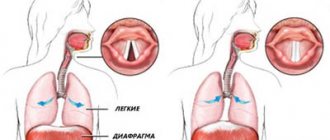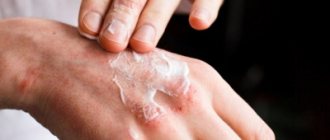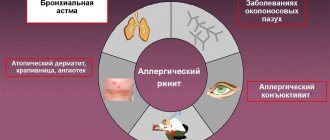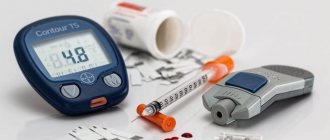Definition
Hiccups are periodically occurring involuntary myoclonic contractions of the diaphragm with possible involvement of the intercostal muscles (usually unilateral). The contraction results in a sudden inhalation followed by closure of the glottis, which is accompanied by a characteristic sound.
Duration
Short-term – up to 48 hours; long-term – from 48 hours to 1 month; intractable – more than 1 month.
Prevalence
Prolonged, difficult-to-control hiccups are quite common in patients with advanced cancer.
Anatomy and pathophysiology
The physiological mechanism of hiccups remains unclear. The hiccup reflex arc includes:
- afferent pathways: phrenic and vagus nerve pathways, sympathetic nervous system;
- diffuse “hiccup center”: midbrain, brain stem, proximal cervical spinal cord (C3 – C5);
- central neurotransmitters: dopaminergic and gamma-aminobutyric acid (GABA);
- efferent pathways: diaphragmatic, vagus and intercostal nerve pathways, conducting signals that cause contraction of the diaphragm.
Classification
Mild, short-lived hiccups
A common phenomenon, it can occur in anyone and usually goes away on its own. The causes of such hiccups can be: stomach irritation (overeating, aerophagia, that is, swallowing air into the stomach), consumption of carbonated drinks, spicy foods, alcohol, rapid distension of the stomach, as well as psychological factors, sudden temperature changes, smoking, etc.
Prolonged hiccups
May be caused by various reasons:
Peripheral
- gastrointestinal: gastroesophageal reflux (GERD), hiatal hernia, gastritis/peptic ulcer, gastric paresis, intestinal obstruction, cholecystitis, irritation of the diaphragm, gastric distension, pancreatitis, tumor;
- non-gastrointestinal: myocardial infarction, pericarditis, aortic aneurysm, enlarged thyroid gland, asthma, bronchitis, pneumonia, tuberculosis, otitis media (irritation of the eardrum).
Central
- neurological: cerebrovascular disorders (stroke), traumatic brain injury, intracranial tumor, multiple sclerosis, epilepsy, Parkinson's disease;
- psychogenic: anxiety, excitement, stress, fear.
Metabolic
- disturbance of electrolyte metabolism caused by excessive fluid intake: hyponatremia, hypokalemia, hypocalcemia;
- hyperglycemia, uremia, hypocapnia, hypoadrenalism (adrenal insufficiency) and other biochemical imbalances; Intoxication: infections, alcohol, oncology, etc.
Medicinal : opioids, benzodiazepines, glucocorticosteroids, dopamine agonists, cytochemotherapeutic agents, antibiotics, etc.
Others : surgical interventions, hepatomegaly.
Intractable hiccups
Of all the above reasons, intractable hiccups are most often caused by:
- pronounced distension of the stomach;
- liver enlargement;
- mass formation or acute cerebrovascular accident;
- irritation of the vagus and pharyngeal nerves (space-occupying formations in the neck, lungs, mediastinum, compressive nerves; esophagitis, esophageal obstruction, chest surgery);
- metabolic disorders;
- medications (eg opioids).
Anamnesis:
- the severity and duration of each episode of hiccups (severity does not always indicate a serious organic cause; in some cases, mild hiccups may be difficult to control);
- the relationship between hiccups and sleep (if hiccups disappear during sleep, a psychogenic factor is a possible cause);
- associated signs and symptoms;
- previous injury, surgery or acute illness;
- medication history;
- characteristics of previous episodes of hiccups, measures taken to relieve them and their results.
Physical examination to identify possible causes of hiccups:
- general appearance: signs of intoxication;
- head: tension of the temporal artery;
- ears: foreign object irritating the eardrum;
- throat: pharyngitis;
- neck: enlarged thyroid gland, cyst, enlarged lymph nodes, neck stiffness, tumor;
- chest: signs of pneumonia, pericarditis;
- abdomen: bloating, bowel sounds, tension, enlarged liver;
- nervous system: signs of acute cerebrovascular accident; delirium due to toxic/metabolic causes.
Why does breathing fail?
The vagus nerve is responsible for the occurrence of hiccups. This part of the nervous system sends signals to the respiratory center. Sometimes, under the influence of various factors, the vagus nerve is irritated. It begins to transmit random impulses to the breathing center. The brain, in turn, sends incorrect signals to the respiratory muscles. As a result, spasms of the diaphragm and intercostal muscles occur.
During such convulsive contractions it is very difficult to take a full breath. The epiglottis blocks the airways, the air flow does not enter the lungs and a characteristic hiccup sound appears. Such convulsive shallow breaths are repeated again and again. The duration of diaphragm spasms can vary.
Is it possible to die from hiccups if the attack continues for a long time? This condition is usually not dangerous. Sooner or later, the irritation of the vagus nerve goes away, breathing returns to normal, so the hiccups disappear.
Treatment
Non-drug
It is recommended for use before the use of medications; it is prescribed purely individually. The most common types of non-drug therapy are the following.
Changing the diet : reduce the single volume of food taken with an increase in the frequency of intake.
Use of mint infusion : helps relax the sphincters, should be freshly prepared, not used together with prokinetics that increase the tone of the muscles of the stomach and intestines and the lower esophageal sphincter.
Nasopharyngeal stimulation techniques:
- rinse your nose with cold water;
- suck cold water through a straw, swallow or suck small pieces of ice;
- swallow 1 teaspoon of dry granulated sugar;
- quickly drink two glasses of water;
- gargle with water;
- suck on lemon slices;
- swallow pieces of dry bread;
- inhale saline solution through a nebulizer;
- stretch your neck;
- massage the soft palate for 1 minute;
- stretch out your tongue with your fingers;
- press hard on your tongue.
Preventing irritation of the diaphragm : bend forward, pressing your knees to your stomach.
Stimulation of the C5 dermatome (interrupts stimulation of the hiccup neural arch):
- patting or scratching the back of the neck;
- placing a cold, safe metal object behind the collar (for example, a key);
- cold compress on the face.
Breathing manipulations:
- holding your breath;
- causing sneezing or coughing;
- frequent deep breathing (hyperventilation);
- breathing into a paper bag (hypoventilation);
- “Valsalva maneuver” (forced exhalation with the nose and mouth closed). Should not be carried out if you have a cold, because... the infection can penetrate into the middle ear cavity, and in patients with heart disease (increases blood pressure). Use caution in patients with pulmonary emphysema, primary/secondary tumor lesions of the lungs, so as not to provoke pulmonary hemorrhage.
Medication
Treatment for hiccups is determined by the cause of its occurrence. In palliative care, hiccups are most often caused by several causes; as a rule, an integrated symptomatic approach is used for treatment (see Diagram 1, Appendix 1).
Table 1 shows the medications and dosages used in the treatment of hiccups. The route of administration of drugs is oral (inside), unless otherwise indicated.
Who are Ikotka and Pam? We talk about mythical creatures from the series “Territory”
Residents of some villages in the north of the Perm region still believe in creatures from the legends of the Komi-Permyaks.
After the launch of “Territory” (16+) on television, Internet users from all over Russia began to actively “Google” the names and origins of the Komi-Permyak monsters that the heroes of the series face. Ikotka and Pam aroused particular interest among fans.
“Vkurse.ru”, together with the deputy dean of the Faculty of Philology for the Komi-Permyak-Russian department of the PGGPU Alevtina Lobanova, figured out the origin of Ikotka and Pam and found out whether they exist in our time.
What does Hiccup look like?
On the Internet, information about Ikotka’s appearance varies extremely. Some describe this creature as something similar to mold, others say that Hiccup looks more like a black liquid. Alevtina Lobanova says that there is no reliable description of Ikotka in any archival document. The creature was described as a white butterfly, a white liquid, and even a small mouse.
Photo: modern vision of Ikotka.
Artist Igor Skaletsky A person will be able to see a mythical creature only if he is exiled, says the professor.
How does Hiccup possess people?
The creature always enters a person through the mouth and only to adult women, says the deputy dean of PGGPU. According to legend, it is enough to swear obscenely on the street or drink water or kvass in someone else's house.
“Mom kept swearing that red-haired Vanka infected her. We had such a man in the village. She said that she drank his mash, but she doesn’t know why. And when Ikotka woke up in her, she told her mother that she couldn’t get out of her - her tail was stuck. Ikotka said that my mother was “cokoraya” (thin - editor’s note), and my mother did not swear or drink, recalls Alevtina Lobanova’s childhood story.
A teacher at the Perm Pedagogical University claims that in her home village in the Komi Okrug, every second woman had Ikotka. She did not interfere with life; everyone lived to a ripe old age, managed the household alone and raised children. Well, if this entity bothered someone too much, healers came to the rescue.
How do you understand that Hiccup has possessed you?
According to Alevtina Lobanova’s description, a person begins to feel a kind of obsession. But, unlike the events in the series “Territory”, Ikotka does not pose any danger. The professor claims that the creature only talks to its host, and the “infected” woman herself begins to speak while inhaling, and not exhaling, like ordinary people.
Who is Pam?
In addition to Hiccup, who possessed the main character of “Territory,” a certain Pam is often mentioned in the series. Little is known about him, because, according to Alevtina Lobanova, there is very little information about this creature even in legends.
Photo: cultural map of the Komi Republic
- Pam is an evil creature. I know that he could cause damage, and they turned to him for this. You can compare it with an evil sorcerer. Among the Komi-Permyaks in the south, this name does not function,” says the PGGPU teacher.
In search of Ikotka and Pam
The action of the series “Territory” takes place in the village of the Kudymkar region of the Kama region in our days. According to the scenario, dozens of local villagers sincerely believe that the monsters from the legends exist and really do not like strangers in their land.
It turned out that this was not the writers’ imagination. Every year, philology students travel to similar villages in the north of the Perm region to study the stories of the Perm Komi people. True, there are fewer and fewer people who remember ancient legends every year.
— Deep in the villages, the belief that a person’s life and health can be magically influenced still exists. About 20 years ago, in my village, across the house lived sorcerers and healers who treated diseases and cursed. Now the village is dying out,” shares Alevtina Lobanova. - So, just recently the last woman in whom Ikotka was sitting died. Our students visited her, researchers came to her. She was always sharing stories.
According to researcher Lobanova, there are especially many such mystical villages left in the north of the region, that is, in the Gainsky and Kosinsky regions.
How to get rid
So, we found out that you cannot die from hiccups. Is it possible to quickly stop an attack? After all, although this condition does not pose a danger, it is still extremely uncomfortable. I want to get rid of hiccups as soon as possible. How to do it? There are several methods:
- Drink a glass of water in slow sips.
- In the period between spasms, try to take a deep breath and hold your breath.
- Massage the diaphragm area.
- Place a piece of lemon on your tongue.
- Pull sharply on the tip of your tongue. This helps stimulate the cranial nerves and stop hiccups.
- Dissolve a piece of sugar in your mouth.
Usually these measures are enough to stop the attack. Drug treatment is required only for prolonged, frequent and persistent hiccups. The sedatives Corvalol and Valocordin are prescribed, as well as the antiemetics Cerucal and Motilium. These medications help relieve irritation of the vagus nerve.
In more severe cases, anticonvulsants Finlepsin and Baclofen are used. But such medications are strictly prescription and should only be taken as prescribed by a doctor.
Causes
Factors that provoke the occurrence of an unpleasant phenomenon are:
- Impaired functioning of the nervous system.
- Dysfunction of the internal organs of the digestive tract.
- Irritation of the walls of the larynx and pharynx.
- Inflammatory processes in the lungs and surrounding pleura.
- Mechanical effect on the vagus nerve, which leads to its compression.
- Failure of the cardiovascular system, change in pulse.
Based on this, the conclusion suggests itself that hiccups can be a symptom of a disease of the internal organs.
How dangerous is this?
Have patients died from hiccups in medical practice? Such cases have never been recorded in the history of science. Even long and persistent hiccups have never resulted in death. As we have already mentioned, only diseases accompanied by irritation of the vagus nerve can lead to death. Hiccups in themselves are not dangerous.
To the question: “Can you die from hiccups?” medical science gives a clear negative answer. But does this mean that such a symptom can be ignored? A single and short attack of hiccups should not cause concern. Most likely, it is associated with physiological reasons. But if attacks of hiccups last more than two days, then you need to visit a doctor and get examined. It is also necessary to seek medical help if hiccups are accompanied by a cough, headache, or deterioration in health.
Possible consequences
Are hiccups so harmless? If attacks occur over a long period of time, this significantly worsens the patient’s quality of life. Persistent and persistent hiccups exhaust a person. The patient's sleep deteriorates, swallowing and breathing problems occur, body weight decreases, and fatigue appears. Medicine knows of cases where postoperative sutures did not heal well in surgical patients due to hiccups.
Therefore, if such a problem has been bothering you for a long time, then you should not expect that everything will go away on its own. You need to see a doctor, determine the cause of the hiccups and undergo a course of treatment.










